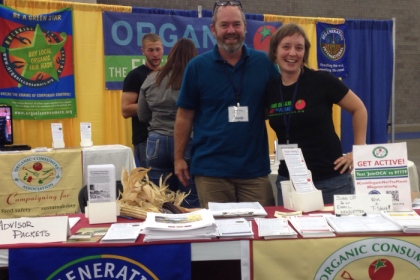
Organic: The Future of Farming
November 11, 2015 | Melinda Suelflow
Organic Consumers Association
The theme at this year’s National Future Farmers of America (FFA) Convention and EXPO in Louisville, Ky., was #AmplifyFFA. Amidst the sea of flashy corporate displays complete with gimmicks, games and giveaways to attract young FFA students, I had to wonder what message, exactly, is FFA trying to amplify at the National Convention and EXPO?
At the convention, I spoke briefly with a Bayer CropScience employee, who assured me that I don’t need to worry about the impact of bee-killing neonicotinoid pesticides on our pollinator populations because Bayer has some “really intelligent people working on the problem.”
A young woman working for Monsanto let me know, in no uncertain terms, that the Biotech Giant’s “America’s Farmers” community outreach programs are building stronger rural communities. Naturally she didn’t mention that you can only get one of Monsanto’s community grants if you grow at least 250 acres of Roundup Ready corn, soybeans or cotton; or 40 acres of field vegetables. Most of the organic farmers I know wouldn’t be eligible.
But the biggest underlying message at this year’s conference was actually a question. “How will we feed 9 billion people?” Bayer, Monsanto, Dupont, Syngenta and Food, Inc. were quick to offer their solution: GMO seeds, crop protection (pesticides), and other technological solutions. Not on their list? Organic and regenerative farming methods—methods the United Nations Conference on Trade and Development say are the only way to not only feed the world, but also solve the global warming crisis.
FFA’s mission is to “make a positive difference in the lives of students by developing their potential for premier leadership, personal growth and career success through agricultural education.” Students are involved in local chapters, state associations, leadership roles, public speaking competitions, supervised agriculture experiences and more. Many FFA students don’t have a farming background and may be interested in a career in agriculture that doesn’t involve farming.
After talking to the teachers and advisors we met in Louisville, it’s clear that the dominant method of agriculture presented to students in FFA is still the conventional model of pesticides, GMOs and factory farms. A quick glance at the list of convention and teacher and student workshop sponsors (Monsanto, Tyson Foods, Dupont Agriscience Institute, Merck Animal Health, etc.) confirms this.
So what was OCA doing in Louisville? We teamed up with the Greenhorns, for the second year in a row, to present a different perspective on farming and feeding the world, that of regenerative organic agriculture.
We were pleasantly surprised at the increased number of FFA advisors and teachers stopping by our booth for educational resources. And even more excited by the fact that our conversations with students and advisors were more upbeat and positive than last year. One seasoned FFA teacher even said that he sees an “awakening” starting to take place within FFA. An increasing numbers of students and teachers are realizing the importance of organic and regenerative agricultural methods in creating a more sustainable food system.
One teacher was willing to recognize his own shortcomings in the classroom: “I teach so biased,” he chuckled at himself, picking up a copy of our advisor’s packet with Jack Kitteredge’s “Soil Carbon Restoration: Can Biology do the Job?” article and OCA, Regeneration International and MOSES leaflets. “But I want the kids to be able to make their own decisions.”
It seems that at least some of the students are doing just that. When asked why they are interested in organic food and farming, students stopping by our booth had this to say:
“I’m organic because of the market, to make more money.” – FFA student and blueberry farmer with 30 acres of organic blueberries.
“Transgenic causes cancer and disease. When you eat organic you clean your body and there isn’t animal mistreatment.” – FFA student from Puerto Rico
“It’s good for the land, good for the planet.” – FFA student from Arizona who is moving to her family’s farm in Kentucky to farm organically.
“Tastes better, more nutritious and you’re not putting chemicals in your body.” FFA student from Ohio
“It’s healthier, more environmentally friendly and to me it’s more ethical.” – FFA student from Virginia
So what message won out at the end of the day? It’s hard to say, we were only a few voices in a sea of industrial agriculture advocates. But we’ll be back next year with the Greenshorns to make sure that the message of organic regenerative agriculture has a place at the FFA National Convention.
Melinda Suelflow is campaign coordinator for the Organic Consumers Association.
